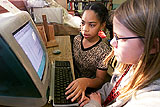Posted on: Wednesday, February 21, 2001
Some computer software useful in teaching physics to children
By Karen Thomas
USA Today
What if gravity turned off, and time stopped?
 |
| Sixth-grade students Valina Jenkins, 11, left, and Kate Rose, 11, right, use the computer program ThinkerTools at Longfellow Arts and Technology Magnet Middle School in Berkeley, Calif. |
If that were possible, students would be able to "see physics" and gain a better understanding of a tough-to-teach subject.
A 20-year-old free software program allows kids to do just that — and has helped some sixth-graders outperform high school physics students on achievement tests. The software is among computer-based tools cited in an analysis of classroom technology tools by researchers at the Center for Technology in Learning at SRI International, a research firm in Menlo Park, Calif.
The report looked at studies aimed at determining what classroom technologies actually help children learn — many programs don’t.
The education marketplace is filled with programs, for example, that try to make math drills and practice entertaining, but that actually diminish achievement, researchers have found.
On the other hand, effective use of technology in schools often goes hand-in-hand with curriculum changes and intense training, so it’s often difficult to tell whether improvements are a result of software or a new teaching approach.
General findings of the report indicate that technology tools are most useful for helping illustrate difficult-to-grasp concepts in physics, algebra and calculus. The evidence suggests that computer-based learning works best to help struggling
students catch up with peers. Also: Most successful demonstrations of computer learning appear to take place in middle and high schools; few are seen in early elementary years.
Ultimately, the crucial component for success is a combination of technology, content and teaching method, said SRI’s Barbara Means, co-author of the analysis. "Technology is often treated as something in isolation," she added, but studies suggest it’s most powerful when a teacher uses it to teach specific concepts.
The report also points out often-overlooked negative effects of computers on children, said education psychologist Jane M. Healy, author of "Failure to Connect: How Computers Affect Our Children’s Minds and What We Can Do About It" and a member of the Alliance for Childhood. The group believes schools should hold off investing in technology until more is known about its effects on child development.
She said more research is needed before technology takes over schools. Research "needs to move out of an academic setting and get into a real classroom," she said.
"In practice, computers get used as games, or worse, to create negative learning habits."
Healy said that ThinkerTools is "one of the good ones." A science program for middle-schoolers, it uses computer animation to illustrate complicated science concepts such as "force equals mass times acceleration" on the screen.
The classroom, not the PC, holds the key to effective use of the program, according to Suzy Loper, a sixth-grade teacher in Berkeley, Calif. "It’s great software," she said. "But you can’t put kids in front of it and say, ‘Go to it.’"
She said she creates a conference setting, with name tags and banners welcoming them to the Conference on Scientific Friction. Little time is spent memorizing formulas, which will be taught in high school. But "the kids start to think and talk like scientists," she said.
"Rarely does software help kids learn anything; it’s all about kids working together," said Barbara White, creator of ThinkerTools and a professor at the University of California-Berkeley.
The program "enables them to create and play with the world and do things and see things you can’t normally see, and then think analytically about it," she said. "That we got across a difficult idea isn’t surprising. What’s surprising is that it’s not widely done."
Students use the scientific method: They wonder, formulate questions, guess at answers, then test them out. "It stays with them and gets better if you keep doing it," White said.
[back to top] |